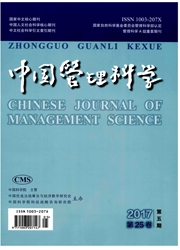

 中文摘要:
中文摘要:
我国农村水环境污染日益严重,准确地度量各类农村水环境治理措施的减排效果对于后续政策制定具有重要的参考价值。由于农村水环境污染物监测数据偏少,且存在非平稳性特征,传统方法难以有效度量各类政策作用效果。为此,本文采用多变量离散灰色模型构建减排量测度方法并进行实证研究。首先,梳理了1995年以来我国颁布的农村水环境管理政策,根据政策内容和目标进行归类并选择代表性政策;然后,采用单元调查评估法核算农村各类水污染物排放量;进而将各类政策作为虚拟驱动项引人多变量灰色模型,并采用竞争性模型策略设定一系列减排测度模型,通过适配结果选择最优模型从而度量各类水环境政策的减排效应。研究结果表明,(1)我国农村水环境管理政策总体上具有较好的减排效果,COD、TN、TP三类污染物的年均减排量分别为54.25、66.08和12.9万吨。(2)三类政策减排效应存在一定差异性,“产业与经济型”政策群的减排效应低于“命令控制型”和“自愿参与型”政策。(3)省际层面的政策减排效应存在一定的空间聚集特征。最后,提出了我国农村水环境管理的对策建议。本研究为数据匮乏条件下的政策效应测度提供了借鉴和参考。
 英文摘要:
英文摘要:
With the growing pollution of rural water environment in China, accurate emission reduction measurement of rural water environment management is significant for the subsequent policies. It is difficult to effectively measure the effects of different kinds of policies due to the relatively small amount of data as well as its non-stability characteristics. Therefore, a multivariate discrete grey model is introduced to measure the emission reduction effect and then an empirical research is conducted. Firstly, the policies related to rural water environment management since 1995 are sorted out, and then they are classified into different groups and some representative policies are selected respectively according to the contents and targets. Secondly, the amount of different kinds of water pollutants emission is computed using the unit investigation and evaluation method. Furthermore, different groups of policies are introduced as virtual driv- en variables into the model, and competitive models strategy is adopted by setting a series of emission re- duction measuring models. By comparing the adaptability among those models, the most adaptive model is selected to measure the emission reduction effect of different policy groups respectively. The research results show that rural water environment management policies are effective in general. Meanwhile, there exists certain difference about the emission reduction effect among three groups of policies. Moreover, the effect displays a spatial-clustering feature at province level. Lastly, some countermeasures are proposed to improve the management of rural water environment in China. It is hoped that the study will provide some reference for measurement of policy effectwith insufficient data.
 同期刊论文项目
同期刊论文项目
 同项目期刊论文
同项目期刊论文
 期刊信息
期刊信息
